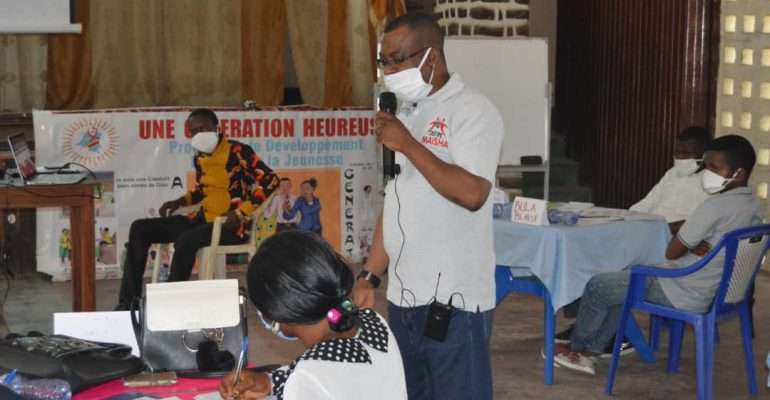According to several analysts, the DRC in general and its eastern part in particular, is significantly lagging behind in achieving the UNAIDS objectives 90, 90, 90. This is attributable to political instability of the last 5 years, characterized by bad governance, political intolerance and other forms of violence in our dear beautiful country. The instability continues to provoke a sense of revolt, despair, anger, and uncertainty among young people, most of whom are unemployed. This dark picture explains the slowing down of activities in the fight against HIV and AIDS which has been accentuated with the Covid-19 crisis.
Despite these obstacles, Maisha Centre has taken the option to work for the blossoming of young people. Through the AHAPPY program, Maisha Center supports young people in the realization of their life projects and the elimination of HIV. While respecting the recommended barrier measures against Covid-19, the Centre organizes 3-day training sessions for peer educators from associations, clubs, groups, and movements of Catholic action in the urban-rural parishes of Kisangani.
This year, the first wave of this training has reached the Consolata Parish of Segama, and the Parish of Saint Gabriel of Simi-simi, with a participation of 20 people, 13 men and 7 women. The second wave of this training will be held in the second week of July 2020.

This training not only strengthened the PE team in the fight against HIV but also revitalized associations, clubs, groups, and youth movements in the fight against COVID-19 and counter values. Young people are also encouraged to take care of themselves, to be creative (entrepreneurship) and to manage their groups well.
During these three days, several themes of the Happy Generation Program were exploited, notably the Presentation of the AHAPPY Programme, an overview on the situation of COVID-19 and HIV in the DRC and Kisangani, My body and me, I am a beloved creature of God, Basics of COVID-19, God and me, Developing my intellectual qualities, Knowledge about STIs, The five dimensions of life, Values and virtues, Risk factors and vulnerabilities of HIV infection in young people, Facilitation techniques, etc.
At the end of the training, eight participants (four men, four women) out of a total of 20, volunteered to take the screening test before committing themselves to sensitizing their peers. This act reflects not only the confidence of the young people in the work of the Maisha Centre in the principles of confidentiality and supervision, but also the concern to preach through example and the determination of the new team to push their peers to know their serological status in order to better prevent themselves.
The young people formed during these days showed their joy and willingness to pass on the information received within their respective groups and movements so that each young person present in these structures can lead a fulfilled life. This positive reaction from the young people nourishes our hope to overcome HIV&AIDS and Covid-19 even if the way still seems to be long.
Kisangani, July 02, 2020
Norbert Bolenza Loose
Youth Mentor,
Maisha Center.

